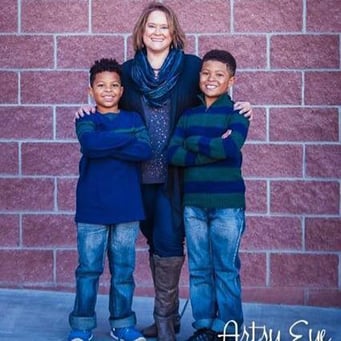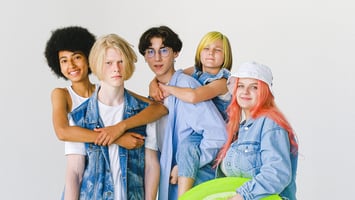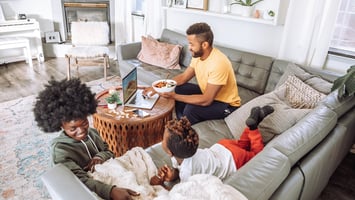At the center of every relationship between a foster child, foster family, and biological parents is a foster care agency. Agencies help support all three groups with training, support programs, and other services. It’s a big job, and it’s not always easy to get right.
When agencies and foster families are united in their goals and are striving to do what’s best for a child and their biological parents, everyone thrives. Few people understand that better than Megan Walsh.
With over 20 years working in foster care, Megan is in a unique position to understand both sides of the foster care world, because she’s also been a foster parent and adopted a child through the foster system.
We spoke with Megan to learn more about the lessons she’s learned, and get tips on the best way we can support children and their families.
Washington Foster: Can you tell us about your experience with foster care?
Megan: I worked in foster care and adoption for over 20 years. I’ve been both a foster parent and a parent through adoption. I worked at a private adoption and foster care agency in New Mexico for a little over 20 years, and I was the director of adoption services.
I’ve supported family preparation, designed training curriculums, and connected families with experienced, trained therapists. Last summer, I moved here to Washington, where I currently work with Encompass. We provide in-home therapeutic support for foster and adoptive families.

Washington Foster: What were you looking for when you were recruiting families?
Megan: Oftentimes people feel like we're looking for somebody with a perfect home or perfect life history. In reality, I think the families that do best are families that can kind of thrive in a little bit of a messy, chaotic life. We want families that understand that they don't know everything, that there's always more to learn.
We want them to be able to have adjustable expectations of themselves, of the kids, of bio-families, as well as the system because it can be really frustrating to work within a system that you often don't fully understand.
So to be able to have people who have gone through some difficult things in life and have been able to rebound, I think that’s really helpful. Because you don't want people to be experiencing the hardest time of their lives when they're trying to help a child who's struggling to heal.
Washington Foster: What was the most surprising thing you experienced in your time supporting foster care?
Megan: Sometimes, the wisdom that foster parents have is minimized. They're often not listened to, even though they’re taking care of these kids 24/7, and likely the ones that know them best.
That really shifted the way that I work with foster parents in helping them to feel heard, in helping them to feel like they have an advocate, and part of that is because of my lived experience as a foster parent.
Washington Foster: What advice do you have for foster parents in a system that’s not listening to them?

Megan: I think it's vitally important that foster parents be able to recognize the challenges within the system. They really need to be able to keep the focus on the child's best interests and not get caught up in the red tape that can happen.
As a professional, I think people really need to just listen, and not be afraid to let the foster parents have a voice. There may be things going on in a case that the foster parent doesn't know, but as professionals, I think we still need to listen to them, and encourage them to advocate for what they see as the child's needs.
Washington Foster: What has been the most meaningful experience for you as a foster parent and as a foster care professional?
Megan: The relationships that I've gained out of being involved in the foster care and adoption world. Early on, my day job was to create a community for foster and adoptive parents, and so the relationships that I've built through that process have been incredibly important, and meaningful, and helpful to me.
Building that sense of community is what has been the most meaningful thing to me, aside of course from being able to be my kids' mom. They show me every day what resilience and connections can do for people.
Washington Foster: Do you have a favorite story of reunification from your time in foster care?
Megan: I worked with a foster family that was taking care of a three-year-old girl who came into the system as a result of her parent’s lack of familial support, drug use, and pretty significant battles with mental health issues.
From day one, the foster family had hoped to adopt the child. But after visiting with the biological family and the child, the foster parents really became committed to supporting the biological family as well. They became partners with the biological parents.
They focused on sharing information and welcomed them into their home. I know that’s not always a common thing, but it helped everyone put aside their wants and do what they needed to show up big for the kiddo.
I'm actually still in touch with the family. It hasn't always been easy. There have definitely been ups and downs, but the little girl is now back with her bio-family, and they're still connected to the foster family, who provides backup or babysitting whenever it’s needed.
In the end, the biological family, who really didn't have any community support, and really struggled in a lot of areas, they’re now part of a healthy community because of the connection with their child.
Washington Foster: Any final advice for potential foster parents?
Megan: It's so important for kids to have people in their lives, whether it’s from a parent, a mentor, or a foster parent. Any way that children can have some sort of connection is really good. While not everybody can be a foster parent, everybody can do something, and I just would really encourage people to do whatever they can to support a child.
Are you ready to start your own story of reunification? Find out how foster parents support children reconnecting with their biological parents by reading our free resource: Is Foster Parenting Right For You?




